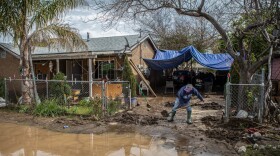Fire has chased more than 500,000 people from their homes. Many stayed with friends and family, others scrambled to check-in to hotels and motels. Some chose to sleep in their cars. And then there are thousands who have nowhere to go, other than evacuation shelters, where they sleep on cots in gymnasiums and community centers. Reporter Joanne Faryon spent some time at the Chula Vista Evacuation Center Tuesday. She found people filled with gratitude and hope.
At first, it looks as though there are more volunteers than evacuees….so many people offering help. There's a stack of toilet paper and a wall of water bottles in the corridor.
The door straight ahead leads you into the sleeping room. Cots and plastic lounge chairs are set up so orderly it looks calm despite the chaos outside.
There's even a makeshift clown making animal balloons for kids. In another section, people are eating and watching TV. Joyce Kelly is a 68-year-old grandmother sitting at a table in an evacuation center. A situation that leaves her slightly in shock.
Kelly: And I didn't know what I should take, I didn't know whether I should just bring me some overnight clothes, or should I look around the house and find possessions. I didn't know. Then I decided what will be, will be, and if something happened to me I wouldn't see these possessions anyway. So I just packed me up some overnight clothes and I left, leave the rest up to God.
Joyce's 15-year-old grandson Michael Liggins sits next to her. He's been here since Monday and describes his night.
Liggins: It was alright, it wasn't too noisy, it's sanitary, there's almost too much food, and there's tuff to do, so I'm alrigh
One table over is 83-year-old Ken Milbunn. He's got his best face on, laughing at his plight. He was told to leave his 130 year-old house Monday night. But Ken has a reason to be hopeful. He knows modern technology can save his house. It's technology he helped develop more than 50 years ago. That's when he flew helicopters that were capable of dropping water from buckets onto fires.
Milbunn: So we experimented with a lot of things we didn't know how to do, and dropping water from them was one of the things we tried and it worked."
Down the hall and to the right is a room with piles of blankets, clothes, and towels. There is a large blue bin, as a big as a laundry basket, full of tooth brushes. A second bin is loaded with toothpaste. And it all just coming as people arrive with donations.
Jackie Jackson came to help Monday.
Jackson: It is an honor for us to come here and to what little we can do. We might ot be reach or anything, but we're rich with love. Just do what little you can, it makes you feel good inside.
Many of the people here, more than 400 at last count, don't know whether they still have a home. But rather than talking about loss, they talk about gratitude.
Ken Milbunn, so full of good humor throughout our interview, changes his expression for barely a second when he talks about his wood house, and then optimism took over .
Faryon: Have you thought about what if you don't have a place to go home to?" It's there, it's there, positive thinking.
For KPBS News, I'm Joanne Faryon.





